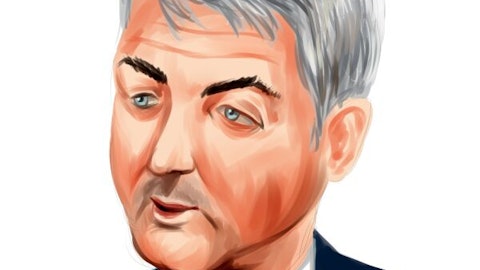So the network is recovering. Networks recovered quite well. There’s a lot of business to be moved and depending on what February looks like and how we close March and Q1 on the weather side, we think we can make up a lot of that volume and get back to kind of a more normal environment, Q1 as far as whether that’s going to help us kind of deliver, I think, a better year-over-year OR and strong earnings growth. So, more to come. I think we’ll have to see how winter plays out, but demand is there. The network is there, and we plan on executing.
Justin Long: Very helpful. Thank you.
Operator: Our next question will come from Cherilyn Radbourne with TD Cowen.
Cherilyn Radbourne: Thanks very much. Good afternoon. I was wondering if you could give us some color on crude by rail volumes in Q4 and whether you think that’s an area which can have some upside for you, just with the completion of the TMX expansion running into another issue here?
John Brooks: Yes. Thanks Cherilyn, it’s John. I think our Q4 numbers were of a little bit. We had some facility issues that really drove that. I can tell you, we’ve got a 2024 plan that is stronger in the crude of rail space. We expect our ERU business to continue strong, and we’ve picked up a couple of other business opportunities. I think — the phones are ringing of fair amount, Cherilyn around TMX and those issues. But it’s just really not an area we’re chasing if the right opportunity presents itself, we’ll go after it. So, I think all of that — you put that into the mix, probably there’s a little bit of upside in 2024, but not massive.
Cherilyn Radbourne: Thank you.
John Brooks: Yes.
Operator: Our next question will come from Brian Ossenbeck with JPMorgan.
Brian Ossenbeck: Hey, good afternoon. Thanks for taking the question. Just wanted to see if you could give us an update on the [Indiscernible] you saw the headlines a little while ago. I’m not sure if we’ve seen the final scope of their review yet. Obviously, something that KCS went through a few years ago didn’t have much of impact of just wanted to see, get an updated thoughts on that? And then, John maybe you can give us some update on just the fluidity of the border cross of you mentioned that a couple of times with 181. Is that actually showing up in conversion as our shippers willing to move some freight, especially as they see the second bridge of Laredo coming on towards the latter part of this year? Thanks.
Keith Creel: Again, bottom-line upfront, you answered the question. The [Indiscernible] CP piece to me, is the government — the government regulatory body that’s charged in Mexico was protecting and making sure competition exists. There have been two different historical [Indiscernible] engagements with KCS Mexico. Nothing has came out of those. I can tell you this one is not targeted at CPKC. We’ve not been served. This is an industry-wide review. And in our case, I know this, the facts don’t support anything, but pro-competitive. We said we’re going to create competition. We’ve done nothing but create competition. I can also say this now that we have control. I’ve looked at the rates we might be guilty of not charging enough of this premium of service, but certainly not guilty of charging too much.
So again, whatever that scope is, whatever that review is, I have nothing to tell me with any indication that we’re going to do anything but be supportive of our case, not dilutive of our case. And let me be quick about the border as well in the interest of everybody’s kind as far as the way we’ve executed. That border has been fluid. That border has not been shut down, not just because it’s the best route going into Mexico, but also because it’s the most secure route. And that didn’t happen because of CP that happened because of the hard work and effort over many, many years of investment, multilayers of security by the KCS team that have established a very secure border that’s only getting more secure as we progress into this. We build a second bridge.
We got more capacity, even more secure, more reliable and more fluid in spite of what not be happening at other borders that don’t represent those same value propositions of securities elsewhere coming into Mexico, between Mexico and the United States. So, again, another of unique value-creating opportunity for us to go to the marketplace when I kind of look at it this way, and I said this, I actually was talking to my Board, obviously, they asked some of the same questions. What does this all this mean? And I’d say I look at it this way. There’s a lot of trucks every day, there’s 1.8 million — there’s 10,000 a day, however you do the math. There’s going to be truck capacity goring across that border, there’s going to be train capacity and you’ve got a choice.
It’s a value proposition. You can ride the Falcon and you can ride the Gemini, whatever you want to call the other alternative services, there’s a value proposition. If you’re prepared to risk some of those very obvious undeniable experiences that our shippers — peer shippers have experienced and price doesn’t matter, then you know what, I kind of look at that as that’s your value proposition. But that’s not ours. We’re going to provide a reliable premium service that warrant and commands and we’re never going to apologize, expects the premium price. It costs a lot of money to provide the reliable service our customers that have awarded us with business that demonstrated it matters. And I can tell you this slide episode of challenges that the border has experienced.
Ours has not experienced the same thing. And as a result, those customers that have chosen to move with us have expressed their deep appreciation and they’re rewarding it with the business. So, again, I make a choice every day if my products got to get from point A to point B. I’ve got a rate I can pay if I want to put a US Postal and I’m saying this in American terms. And I’ve got a rate if I want to pay FedEx or UPS. You’ve got inside what matters to you and your value proposition and where you choose to put your freight and make your decision. And I believe that this value proposition matters even more so than it ever has.
Brian Ossenbeck: Understood. Thanks Keith.
Keith Creel: Okay.
Operator: Our next question–
Keith Creel: And we have one more. All right.
Operator: Next question will come from Brandon Oglenski with Barclays.
Brandon Oglenski: Hey and thanks, Keith for let me sneak my question in here. And John maybe I’ll close out with you on the low single-digit growth outlook this year. I mean I get that there’s a lot of uncertainty in the macro. And obviously, you’ve talked about intermodal and grain, but I think the commentary was pretty upbeat on merchandise. Can you talk about the incremental customer opportunities you see there playing out in 2024 and maybe where you see positive variance to where the industry is going to see growth rate in merchandise?
John Brooks: Yes, Brandon. So historically, the legacy ECP franchise working for us with particularly the strongest merchandise ECP franchise, but the combination is — it’s an area of strength, and I’m super pleased with what the team has been able to deliver in that space early in 2023. Honestly, if you think about the synergies we’ve talked about that, that’s been an overweight area. That’s an area that we achieve more on the backs of strong trip plan, good local service, get those cars and steel cars cycles and tank car cycle. So, as I said, we had some good wins in the back half of the year in terms of share and synergies in that merchandise EPT space. We haven’t even felt the benefits of the bulk of those agreements. We’re going to see that ramp up.





